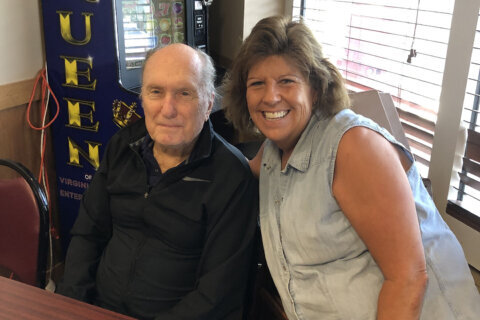Lawyers for the prosecution and defense presented their opening statements in the trial of a man accused of killing a mother and a son in Loudoun County, Virginia.
Prosecutors told jurors that Brian Kuang-Ming Welsh — whose life “spiraled out of control” — killed Mala Manwani, 65, and her son, 32-year-old Rishi Manwani, to steal $3,000 from Rishi Manwani, who had been dealing drugs from the Aldie home he shared with his mother.
Welsh’s trial is expected to take one month.
Senior Assistant Commonwealth’s Attorney Shara Krogh told jurors that Welsh had been fired from his job six days before he allegedly shot the Manwanis almost a dozen times in their Tomey Court home in 2018.
“Rishi was one of Mr. Welsh’s drug dealers,” Krogh told jurors. “The day before, Rishi borrowed $600 from Mr. Welsh.”
Welsh, who had been to the Manwani home, which is located in a quiet residential neighborhood, was in deep financial distress.
“You will hear in Mr. Welsh’s own voice from his conversation with detectives that he saw Rishi with $3,000 in his wallet,” Krogh said. Rishi Manwani, Welsh and another friend, Carlos Rodriguez, had gone to the bank to withdraw money on the day of the killings.
Prosecutors said Rishi Manwani was killed downstairs, where he had a private entrance; his mother was shot upstairs, apparently after reacting to the commotion. Their bodies were found two days later, on Jan. 31, 2018.
“Rishi was a flawed human being,” Krogh said. “He was depressed; his brother had died earlier from a drug overdose; and Rishi sold drugs to anybody who would buy them.”
The jury is not aware that prosecutors had to initially drop murder charges against Welsh in August 2018 because forensic testing showed the bullets recovered from the Manwanis’ bodies did not match Welsh’s gun.
Krogh told jurors Welsh, his brother Michael, and their father were adept at working on firearms.
“Before he gave the gun to his brother, Mr. Welsh changed the barrel of the gun,” she said. “You will see tool marks on the gun that show he changed out the barrel.”
In addition, Krogh said several statements Welsh made to detectives, before and after he was developed as a suspect, contained “discrepancies and inconsistencies.”
Defense: He didn’t do it
In his opening statement, defense attorney Thomas Walsh said the wrong man is charged with the murders. “Brian Welsh did not kill Mala Manwani or Rishi Manwani,” he said.
Walsh said his client and Rishi Manwani mixed business with pleasure. Walsh said Rishi Manwani was “a creature of habit,” with a series of protocols to protect his drug business.
“You had to call and ask him to come by; he was very protective,” Walsh told jurors. “You had to come in through the basement [sliding doors].”
Walsh said his client, despite being financially strapped, lent Rishi Manwani $600 in order to buy more drugs to sell.
“His wife, Amy, found out, and she was upset — she wanted the money coming back,” Walsh said.
Rishi Manwani, Welsh and Rodriguez went to the bank so Rodriguez could withdraw money to pay Rishi Manwani for drugs.
Walsh described that phone and other records would show that Welsh had left the Manwani home to pick up his children from his mother-in-law’s house, had a calm phone conversation with his mother while driving and fielded a call from a headhunter about a job opportunity.
“Amy didn’t want guns in the house. So, Brian gave a gun to Michael,” Walsh said.
Walsh’s analysis of forensic information differed from what prosecutors described.
“The bullets don’t match the gun, and there’s no evidence of them switching the barrel,” Walsh said.
In addition, Walsh said a witness described seeing Rishi Manwani’s white pit bull, Callie, in the backyard of the family home during the period of time between when prosecutors said the Manwanis were killed and when their bodies were recovered.
“Two days later, investigators found no urine, and no poop,” in the house, according to Walsh.
Also, Walsh said Rishi Manwani’s wallet, which was found on his chest, didn’t have his client’s DNA on it, but matched the suspect in a 2000 case in James City, Virginia, in which a 50-year-old woman went into grocery stores, and stabbed children with hatpins and other sharp objects.
Welsh was indicted in October 2019 on two counts of first-degree murder and two counts of use of a gun in the commission of a felony. The maximum penalty for first-degree murder in Virginia is life in prison.
The trial, before Circuit Court Judge James Fisher, is being held in a large courtroom, with jurors sitting several feet from each other because of COVID-19 pandemic requirements.








